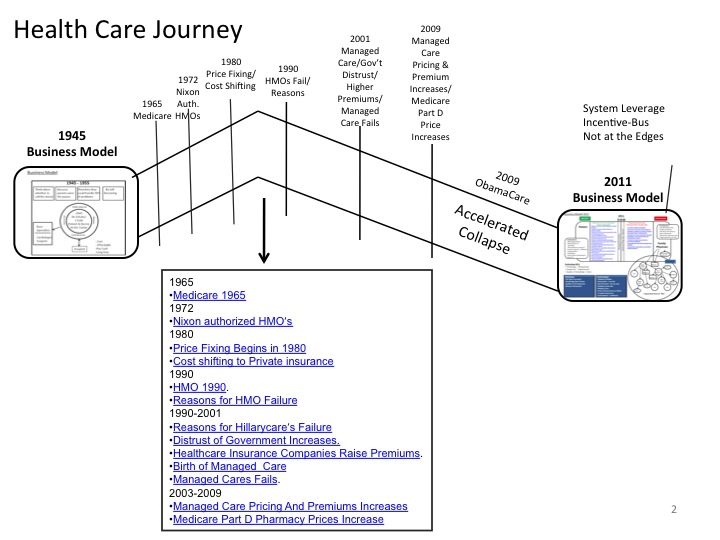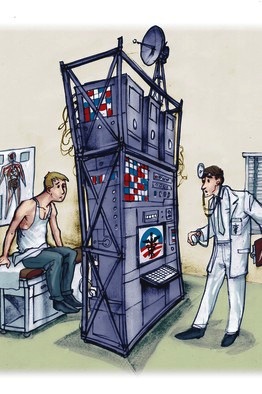I Am Not The Only One
Stanley Feld M.D.,FACP,MACE
Readers ask if I think practicing medicine is becoming more difficult because of Obamacare.
My answer has been it is becoming impossible to practice medicine. The overwhelming bureaucratic rules and regulations are becoming too difficult to understand and even harder to execute.
Patients will suffer the most because of the disappearance of a physician-patient relationship. Patients are being converted from patients to commodities.
“Why don’t more physicians protest? Why don’t they describe their problems in the age of Obamacare?”
There are complex reasons that there has not been an organized physician outcry.
Organized medicine (AMA) and other organizations representing specialties in medicine and surgery are afraid to lead an outcry. Their main goal is to not lose their seat at the table.
This is strange goal. Politicians and their health policy advisers have ignored organized medicine for the last 50 years. Many smart physicians in or out of these organizations have tried to have their voice heard but have failed.
Since Medicare was passed (the last 50 years) there have been many outrageous changes proposed by non-physicians The healthcare policy changes were proposed to decrease the increasing cost of healthcare. Instead these changes have increased the cost of care.
The politicians and healthcare policy advisers are always changing the wrong policies. They are always putting more power into the government bureaucrats and healthcare industry’s hands rather that putting power into the patients’ hands.
Physicians who have seen these policy changes work out for their benefit are hesitant to participate in an Obamacare protest. These physicians assume Obamacare will also work out well for them
However, physicians do not realize that their intellectual property and surgical skills have been devalued with each of the present changes in healthcare policy.
In a 2006 blog I described how to cook a frog without the frog jumping out of the pot water. Everyone knows that you increase the temperature of the water one degree at a time. When the frog realizes what is going on he is too weak to jump out.
Obamacare has increased the temperature of the water to an intolerable level. At present few frogs have the energy to jump out of the water.
Most of the changes in Obamacare are going hurt patients by decreasing access to care and rationing of care. The physician/patient relationship has also been destroyed.
Dr. Mark Sklar, a Clinical Endocrinologist in Washington D.C., had enough energy to jump out of the hot water. He launched his protest in an excellent article and got the attention of the editors of the WJS.
My hope is Dr. Sklar’s article will launch a consumer protest demanding that a change be made from Obamacare to a healthcare system that will empower consumers.
The new healthcare system should be a consumer driven healthcare system that puts consumers in control of their health and healthcare dollars. The control of the healthcare system should not be in the government’s or the healthcare insurance industry’s hands.
A consumer driven healthcare system should provide incentives to consumers to remain healthy, and provide financial reward if they do. It should also make shopper of consumers.
A consumer driven healthcare system will drive the other stakeholders into a competitive mode to vie for the business of the consumer.
The financial reward should be for consumers, not to the healthcare insurance industry, government, hospital systems or physicians.
I want to echo Dr. Sklar’s protest. I will try to help Dr. Sklar make his article a wake up call for consumers.
Consumers are the only stakeholders that can turn the destruction of the medical system around.
Consumers elect politicians. Politicians like the advantages and perks they receive from their elected positions. Politicians are afraid of the consumers that vote to reelect politicians. They will comply with their voters demands.
Below is Dr. Sklar’s article listing most of the issues that are making the delivery of healthcare very difficult.
"Doctoring in the Age of ObamaCare"
"Endlessly entering data or calling for permission to prescribe or trying to avoid Medicare penalties—when should I see patients?
MARK SKLAR M.D., FACE
Sept. 11, 2014 7:35 p.m. ET
http://online.wsj.com/articles/mark-sklar-doctoring-in-the-age-of-obamacare-1410478521
‘It has been four years since the passage of the Affordable Care Act, so I thought it may be useful to provide the perspective of a physician providing daily medical care. I am an endocrinologist in Washington, D.C., and have been in solo private practice for 17 years after seven years at an academic institution. Since 1990, the practice of medicine has changed significantly, seldom for the better.
In the 1990s insurance companies developed managed-care plans that greatly increased their profits at the expense of the physician. With the Affordable Care Act, we are seeing new groups profiting from changes to the health-care system. Entrepreneurs and hospital executives are capitalizing on organizing physicians into groups called Accountable Care Organizations from which they will take a very substantial percentage of collected income. Now that physicians are being required to use electronic medical records, the companies that develop them are harvesting money from physicians' practices and from hospitals.
The push to use electronic medical records has had more than financial costs. Although it is convenient to have patient records accessible on the Internet, the data processing involved has been extremely time consuming—a sentiment echoed by most of my colleagues. To save time, I was advised by a consultant to enter data into the electronic record during the office visit. When I tried this I found that typing in the data was disruptive to the patient visit. My eyes were focused on the keyboard and the lack of direct contact kept patients from opening up and discussing their medical and personal problems. I soon returned to my old method of dictating notes and pasting a print-out of the dictation into the electronic record.
Barrier between Patient and Physician
Yet to avoid future financial penalties from Medicare, I must demonstrate "meaningful use" of the electronic record. This involves documenting that I covered a checklist of items during the office visit, so I spend 90 minutes each day entering mostly meaningless data. This is time better spent calling patients to answer questions or keeping updated with the medical literature.
If electronic records ever allow physicians to obtain data from previous laboratory and imaging testing, it will improve costs and patient care. So far, however, the data in electronic records—like paper charts—can't be shared unless physicians work in the same health-care system.
My practice quickly adopted the new Medicare requirements for electronically prescribing medications. Yet patients often do not want their prescription sent electronically. They want a physical copy—either because they don't trust the Internet or because they don't need to fill the prescription immediately. If I don't electronically prescribe for a certain number of Medicare patients, I am penalized with a decrease in reimbursement that can rise to a maximum of 5%. Patients should have a choice in how their prescriptions are delivered, and physicians shouldn't be penalized for how the patients choose.
To prevent physicians from prescribing more costly medications and tests on patients, insurers are increasingly requiring physicians to obtain pre-authorizations. This involves calling a telephone number, often being rerouted several times and then waiting on hold for a representative. The process is demeaning and can take 30-45 minutes. Rather than having physicians pre-authorize expensive medications, the outrageous costs of many non-generic medications must be addressed. I understand that pharmaceutical companies need to make profits to cover investments in drug development. However, they should have some compassion for their customers.
To avoid Medicare penalties, I also must participate in the Physician Quality Reporting System program. Initially, this involved choosing three codes during the patient visit to reflect quality of care, such as blood pressure or blood-sugar control, and reporting them to Medicare. In 2015, the requirement will increase to nine codes.
Coming down the pike, but thankfully postponed from the October 2014 deadline, is something called ICD-10. This is a newer system that will contain about 70,000 medical diagnostic codes used for billing insurance. The present ICD-9 system has about 15,000 codes. The Physician Quality Reporting System and ICD-10 requirements are intended to benefit population research, but the effect is to turn physicians into adjuncts of the Census Bureau who spend time searching for codes—and to further decrease the amount of direct contact with patients.
The practice of medicine in the current environment is unsustainable. The multiple bureaucratic distractions in my day consume so much time that I have to give up what little personal time I have in the morning, evening and on weekends if I want to continue to provide excellent care during office hours.
If high-quality medical care is the goal, the bureaucracies need to be tamed. Our government and insurance companies understandably want to measure outcomes of health-care dollars spent. However, if the health-care system rewards data entry, that is what it will get—the quality of care seems an afterthought.
The patient should be the arbiter of the physician's quality of care. Contrary to what our government may believe, the average American has the intellectual capacity to judge. To give people more control of their medical choices, we should move away from third-party payment. It may be more prudent to offer the public a high-deductible insurance plan with a tax-deductible medical savings account that people could use until the insurance deductible is reached. Members of the public thus would be spending their own health-care dollars and have an incentive to shop around for better value. This would encourage competition among providers and ultimately lower health-care costs.
By contrast, the Affordable Care Act's plans for establishing "medical homes"—a team-based health-care delivery model—and accountability-care organizations will only add more bureaucracy and enrich the consultants and companies organizing these entities.
To improve quality, we need to unchain health-care providers from the bureaucracies that are strangling them fiscally and temporally. We can better control medical costs if we strengthen physicians' relationships with their patients rather than with their computers.”
“Dr. Sklar is an assistant professor of medicine at the Georgetown University Medical Center and at the George Washington University Medical Center.”
I hope all the consumers of healthcare can feel the pain physicians are experiencing in delivering care on their patients behalf because of Obamacare.
The opinions expressed in the blog “Repairing The Healthcare System” are, mine and mine alone.
Please have a friend subscribe

